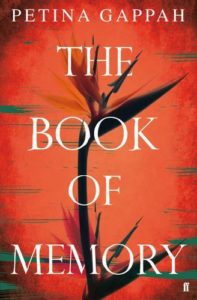Faber & Faber
September 2015
 The Book of Memory is Petina Gappah’s first novel, a tightly woven tale of privilege and prison, of Zimbabwe, and of course memory. It is the fictional memoir of the convicted murderer, Memory. She has been asked to write in service of a potential appeal against her death sentence.
The Book of Memory is Petina Gappah’s first novel, a tightly woven tale of privilege and prison, of Zimbabwe, and of course memory. It is the fictional memoir of the convicted murderer, Memory. She has been asked to write in service of a potential appeal against her death sentence.
Memory is an albino woman. Sent away as a child from her home in one of Harare’s townships to live with a white man, Lloyd, she struggles to find a sense of belonging and of self. She feels neither black nor white; her birth family has rejected her; and with her Cambridge education she is at great odds with her fellows in the Chikurubi Prison. We see as she pieces together clues from her life, trying to work out how it arrived at this ugly point. Of course she professes her innocence of the murder.
Memory’s story is also intertwined with that of the Zimbabwean elections. While I wouldn’t take the comparisons between Memory’s story and Zimbabwe’s too far in terms of her past, there is certainly a symbolic tie. Conditions in the prison are poor, mostly because of the petty corruption of the guards, and little information about the political situation is permitted through. However, hope is building that things will change; that the unnamed president’s regime* will soon come to an end.
The book strongly reminded me of Margaret Atwood’s Alias Grace. Like The Book of Memory, Atwood’s novel features a convicted murderer, a woman, who claims her innocence and who, ultimately, is paying the price for existing in her society at all. As such, I read The Book of Memory with loaded expectations about unreliable narrators, false memories and straight up lies. Since the conclusion in Alias Grace rather irritated me, I was braced for disappointment here. Fortunately, that did not eventuate. Gappah has crafted this story wonderfully, placing red herrings and clues alongside.
I do have some issues with the novel’s portrayals of mental health problems, which I won’t detail here because it would give too much away and the book is yet new. Suffice it to say that those suffering from mental health problems are far more likely to suffer violence or self-harm than inflict violence on others.
The Book of Memory is a mystery, but it is less about whodunnit, and more about Memory’s search for identity and reason. It is meditative, skirting hope and despair, but filled with humour as well. It certainly bodes well for Gappah’s future works, which I look forward to with eagerness.
*I’m not sure if the readers are expected to know the players involved, Mugabe and Tsvangarai. I hope so! Though there are hints of what I assume are real scandals and celebrities that readers outside Zimbabwe may not be so farmilar with as well.

